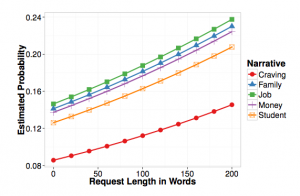 I know this past weekend is more associated with barbeque than pizza, but I came across an interesting study of pizza that I thought I would whet your appetite this morning. For those of those you have spent time on the site Reddit, you know one of their communities is called “Random Acts of Pizza” or RAOP. On the site, people can submit requests for free pizza and if their story is compelling enough a fellow user might decide to send them one. Why not? Who doesn’t like a free pizza?
I know this past weekend is more associated with barbeque than pizza, but I came across an interesting study of pizza that I thought I would whet your appetite this morning. For those of those you have spent time on the site Reddit, you know one of their communities is called “Random Acts of Pizza” or RAOP. On the site, people can submit requests for free pizza and if their story is compelling enough a fellow user might decide to send them one. Why not? Who doesn’t like a free pizza?
Users can only ask for pizza, and only one user can supply the pizza. For example, a request might go something like this: “It’s been a long time since my mother and I have had proper food. I’ve been struggling to find any kind of work so I can supplement my mom’s social security. A real pizza would certainly lift our spirits.” Anybody can then fulfill the order, which is then marked on the site, often with notes of thanks.
It is an interesting community. Because of the way it is structured, a group of data and social scientists used RAOP as the basis for a study that looked more closely at altruism, or what motivates people to give when they do not receive anything tangible in return. Tim Althoff of Stanford University and others wrote the paper published earlier this year in a research journal.
The researchers were able to download the many thousands of requests and eventually analyzed more than 5000 of them where they could track a response, whether it was successful or not, and other variables that they were able to quantify. From the data, they parsed this information and then built a mathematical model that would be used as a predictor of the success of the individual posts.
They found that it helps to ask for pizza earlier in the month, make your request post longer (see the graph above), include an image documenting your request (a copy of a job termination letter or an empty fridge), and show that your request should state that are willing to give back to the RAOP community. This last item bears some further explanation. Most of us would probably be cynical and say, yeah, sure, these folks are trying to game the system and get a free pizza. But the researchers showed that nearly 10% of those that were claiming to pay it forward actually did, which is a pretty high percentage given that many people probably haven’t had an opportunity to reciprocate.
You can also see from the graph above that those stories about jobs, money, or family situations were also more likely to result in pizza deliveries. One item they didn’t find to improve deliveries was that it wasn’t true how the mood of the author was expressed, something that traditional social science research has found in the past.
Yes, thanks for posting about this, David! A very interesting research project that I’m sure could be useful in interpreting why people click through on spam and other nastyware come-ons.
Great article. It is amazing what we can learn by observing what happens in cyber space. TNX